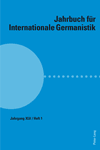
JAHRBUCH FUR INTERNATIONALE GERMANISTIK
Scope & Guideline
Unlocking New Perspectives in German Literary Theory
Introduction
Aims and Scopes
- Intercultural Exchange and Translation Studies:
The journal frequently addresses the complexities of translation and cultural exchange, examining how German literature interacts with and influences other cultures. - Historical and Cultural Contextualization:
Papers often explore the historical contexts of literary works, analyzing their significance within specific cultural and temporal frameworks. - Transnational Literary Relations:
The focus on transnationality is prominent, as the journal investigates the relationships between German literature and other national literatures, especially in the context of migration and diaspora. - Environmental Humanities and Nature Writing:
Recent publications indicate a growing interest in the environmental humanities, particularly how literature engages with themes of nature and ecological consciousness. - Literary Theory and Criticism:
The journal provides a space for scholarly discourse on literary theory, examining various critical approaches to understanding German literature.
Trending and Emerging
- Cultural Memory and Trauma Studies:
Recent publications highlight an increasing interest in cultural memory and trauma, particularly how literature represents and processes historical traumas. - Diverse Voices in Literature:
There is a growing trend towards exploring diverse voices within German literature, including works by authors from marginalized backgrounds and their contributions to the literary landscape. - Digital Humanities and New Media:
The emergence of digital humanities as a research focus is evident, with discussions on how technology impacts the study and dissemination of literature. - Eco-Criticism and Literature:
A significant uptick in eco-critical studies suggests that scholars are increasingly concerned with environmental issues and how they are represented in literature. - Interdisciplinary Approaches:
The journal is embracing more interdisciplinary approaches, integrating perspectives from fields such as sociology, philosophy, and cultural studies into literary analysis.
Declining or Waning
- Traditional Nationalism in Literature:
There is a noticeable decline in papers exploring traditional notions of nationalism in German literature, suggesting a move towards more nuanced discussions of identity and multiculturalism. - Classic Literary Figures and Canonical Works:
While previously popular, the focus on canonical authors and their works is waning, indicating a shift towards contemporary literature and emerging voices. - Historical Narratives of the World Wars:
Research centered on World War narratives is less frequent, possibly reflecting a broader interest in contemporary issues and narratives that transcend historical events.
Similar Journals
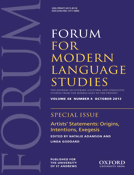
FORUM FOR MODERN LANGUAGE STUDIES
Elevating Research in Literature and LinguisticsFORUM FOR MODERN LANGUAGE STUDIES is a prestigious academic journal published by Oxford University Press that has been serving the fields of literature and linguistics since its inception in 1965. This journal, with an ISSN of 0015-8518 and an E-ISSN of 1471-6860, plays a crucial role in advancing scholarly discourse on modern language studies, including literature and literary theory. With an impactful presence in both the linguistic and literary domains, it has been recognized in 2023 with a category ranking of Q2 in Literature and Literary Theory and Q3 in Linguistics and Language. It stands out in the competitive landscape, holding a notable position within Scopus rankings, including a 70th percentile ranking in Literature & Literary Theory. While the journal currently does not offer open access options, it remains a vital resource for researchers, educators, and students passionate about the transformative power of language and literature. Its commitment to quality research and robust academic discussion underscores its importance, making it a key platform for those aiming to contribute to modern language scholarship.

Interdisciplinary Studies of Literature
Cultivating a Global Dialogue in Literature and TheoryInterdisciplinary Studies of Literature is a premier academic journal dedicated to advancing the field of literature and literary theory, published by KNOWLEDGE HUB PUBL CO LTD in China. Since its inception in 2017, this journal has consistently offered a vibrant platform for scholarly discourse, hailing from a prestigious Q1 ranking in the Literature and Literary Theory category, reflecting its commitment to high-quality research. With a Scopus rank of #455 out of 1106 in the Arts and Humanities category and a standing in the 58th percentile, this journal embraces diversity in literary studies while fostering interdisciplinary connections to critical theories and practices. Academics, researchers, and students alike will find valuable insights and innovative perspectives within its pages, making it an essential resource for those engaged in literary analysis and theory. Engaging with this journal not only enriches understanding but also promotes the evolution of literary discourse globally.

Studien zur Deutschen Sprache und Literatur-Alman Dili ve Edebiyati Dergisi
Innovating research in the heart of cultural studies.Studien zur Deutschen Sprache und Literatur-Alman Dili ve Edebiyati Dergisi is an esteemed academic journal published by ISTANBUL UNIV, FAC LETTERS, dedicated to the vibrant exploration of German language and literature, alongside critical studies in cultural contexts. Operating with an Open Access model since 2017, the journal facilitates unrestricted dissemination of knowledge, ensuring accessibility for researchers, educators, and students worldwide. Based in Turkey, this journal plays a significant role in the scholarly community, as evidenced by its rankings in Cultural Studies, Linguistics, and Literature and Literary Theory. Although it currently holds a Q4 ranking in Cultural Studies and Linguistics and a Q3 ranking in Literature for the year 2023, it offers invaluable perspectives that contribute to ongoing dialogues in these fields. The journal has established convergence from 2021 to 2024, creating a cohesive platform for the latest research and discussions in German linguistics and literary theory, and invites submissions from scholars aiming to enhance the understanding of the Germanic domain.

Naslede
Fostering innovation in philology and cultural studies.Naslede is a distinguished scholarly journal published by the University of Kragujevac, Faculty of Philology and Arts. With an ISSN and E-ISSN of 1820-1768, it serves as a vital platform for the dissemination of research in the fields of philology, arts, and cultural studies. The journal aspires to foster academic dialogue and scholarly exchange, providing researchers, professionals, and students with access to high-quality, peer-reviewed articles that explore the intersections of language, literature, and artistic expression. While it currently does not offer open access options, the significance of Naslede within its field cannot be overstated, as it contributes to the broader academic community by highlighting innovative research and emerging trends in the humanities. Located in Kragujevac, Serbia, the journal is positioned to bridge local and international scholarship, making it an essential resource for those dedicated to advancing knowledge in these disciplines.
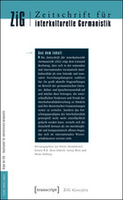
Zeitschrift fur Interkulturelle Germanistik
Navigating the Landscape of Intercultural CommunicationZeitschrift für Interkulturelle Germanistik is a leading academic journal specializing in the field of intercultural studies and German linguistics. Published by TRANSCRIPT VERLAG, this journal serves as a platform for innovative research, critical essays, and interdisciplinary discussions that explore the complexities of cultural interactions within the German-speaking world and beyond. With a commitment to fostering scholarly exchange, the journal invites contributions that delve into themes such as language, identity, migration, and cultural dialogue. Although the journal does not currently offer open access, its robust editorial standards are aimed at providing readers with high-quality, peer-reviewed content. Researchers, professionals, and students engaged in German studies will find this journal an invaluable resource for the latest findings and theoretical advancements in intercultural communication and Germanistik. For more information, visit TRANSCRIPT VERLAG's official page.
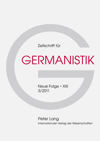
ZEITSCHRIFT FUR GERMANISTIK
Unveiling Insights into German Linguistics and CultureZEITSCHRIFT FUR GERMANISTIK, published by PETER LANG GMBH, is a distinguished academic journal that serves as a vital resource in the fields of German studies, literature, linguistics, and cultural analysis. With an ISSN of 0323-7982, this journal provides critical insights and promotes scholarly discourse surrounding the evolving landscapes of German language and literature. Although it operates under a traditional access model, readers and researchers benefit from its rigorous peer-reviewed articles that span decades of intellectual inquiry. Historically featured in Scopus, the journal is noted for its impactful contributions, ranking 244th in Literature and Literary Theory and 406th in Linguistics and Language, highlighting its importance in the academic community. Situated in Bern, Switzerland, ZEITSCHRIFT FUR GERMANISTIK not only caters to scholars seeking to enrich their understanding of Germanic studies but also aims to bridge gaps across interdisciplinary borders, fostering a deeper appreciation of the cultural narratives that shape our world.
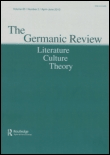
GERMANIC REVIEW
Fostering Dialogue in Germanic Literary and Cultural DiscoursesGERMANIC REVIEW, published by Routledge Journals, Taylor & Francis Ltd, stands as a prominent academic journal dedicated to the study of Germanic languages, literature, and cultural studies. With an ISSN of 0016-8890 and an E-ISSN of 1930-6962, this journal has been a valuable resource for researchers and scholars since its inception, encompassing a wide range of topics within its field. Despite its Q4 ranking in Cultural Studies and Q3 ranking in Literature and Literary Theory, the journal has grown steadily in reputation, with Scopus ranks placing it within the competitive landscape of Arts and Humanities. The journal publishes contributions that delve into historical and contemporary issues, fostering a deeper understanding of Germanic cultures. By bridging literary analysis with cultural discourse, GERMANIC REVIEW invites academics, professionals, and students alike to engage with critical themes and methodologies that redefine the boundaries of Germanic studies. As a subscription-based journal, it remains dedicated to promoting scholarly communication and advancing knowledge in the humanities.
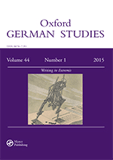
OXFORD GERMAN STUDIES
Navigating the Rich Landscape of German LinguisticsOXFORD GERMAN STUDIES, published by Routledge Journals, Taylor & Francis Ltd, is an esteemed academic journal dedicated to the exploration and scholarly examination of German literature and linguistics. With an ISSN of 0078-7191 and E-ISSN of 1745-9214, this journal has been in circulation since 1966, offering researchers a unique platform for critical discourse, innovative research, and interdisciplinary dialogue. It holds a significant position in the academic landscape, being categorized in the Q4 quartile for Linguistics and Language and Q3 for Literature and Literary Theory as of 2023. Despite lacking open-access options, the journal thrives in providing invaluable insights, aiming to bridge historical contexts with contemporary perspectives on German studies. It serves as an essential resource for scholars, professionals, and students eager to deepen their understanding of Germanic languages and literature. Located in Abingdon, United Kingdom, the journal continues to uphold its mission of advancing knowledge and fostering scholarly discussions in the rich field of German studies.

Studi Slavistici
Illuminating the Intricacies of Linguistics and LiteratureStudi Slavistici is an esteemed academic journal published by FIRENZE UNIV PRESS, focusing on the rich and diverse fields of Cultural Studies, Linguistics and Language, and Literature and Literary Theory. Since its initiation in 2004, it operates under an Open Access model, providing unrestricted access to its contents and fostering a wider dissemination of research. Based in Italy, this journal serves as a vital platform for scholars and researchers engaged in Slavic studies and beyond, encouraging interdisciplinary dialogue and innovative approaches. With its current Quartile rankings in the Q4 category across various domains, it plays a significant role in shaping dialogues within the academic community while offering insights into contemporary and historical perspectives. By maintaining an inclusive vision and engaging with critical issues, Studi Slavistici remains dedicated to advancing knowledge and scholarship in these intricate fields.
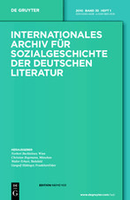
INTERNATIONALES ARCHIV FUR SOZIALGESCHICHTE DER DEUTSCHEN LITERATUR
Delving into the Historical Contexts of Literary CreationINTERNATIONALES ARCHIV FÜR SOZIALGESCHICHTE DER DEUTSCHEN LITERATUR is a distinguished academic journal published by Walter de Gruyter GmbH in Germany, dedicated to the exploration of the social history of German literature. With an ISSN of 0340-4528 and an E-ISSN of 1865-9128, the journal has been a valuable resource since its inception in 1976. The journal aims to provide a platform for scholarly discourse, offering insights into the historical contexts that shape literary production and theory. Despite its current quartile rankings of Q4 in both History and Literature and Literary Theory, the journal remains committed to fostering rigorous academic discussion and attracting contributions that stimulate critical engagement within the field. While not currently available as an Open Access publication, it serves as an essential repository of research for historians, literary scholars, and students interested in the nuanced intersection of social history and literature. Located at Genthiner Strasse 13, D-10785 Berlin, Germany, this journal is an indispensable source for anyone seeking to broaden their understanding of German literary scholarship.